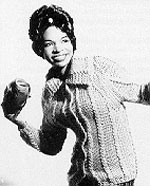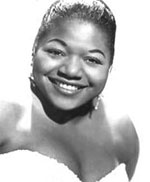
The predominantly soul or r’n’b sounds that Randy had on his list included Nella Dodds’ 'Come See About Me', Ray Pollard’s 'The Drifter', Jackie Ross’ 'Selfish One', Bessie Banks’ 'Go Now', Sandy Wynns’ 'A Touch of Venus', The Astors’ 'Candy', The O’Jays’ 'Lipstick Traces', Bettye Swann’s 'Make Me Yours', and Maxine Brown’s 'Oh No Not My Baby'. Some people could recite the list by rote. Some of these records as they resurfaced would change people’s lives.
Randy would become famous for his Maxine Brown obsession, and he would write the sleevenotes for the 1985 One In A Milion Kent compilation of her Scepter Wand recordings. It’s hard to over-exaggerate the impact this set had on a new generation of soul fans. Songs such as 'Anything For A Laugh', 'I Cry Alone', 'One In A Million', 'Since I Found You', 'Yesterday’s Kisses', and 'One Step At A Time' seemed twenty-plus-years on to be the epitome of what we’d hoped the soul sound could be. One of the most moving things I have ever read is Dave Godin’s tribute to Randy, following his death in 2003. Dave wrote: “Both born and bred on the wrong side of the tracks in London, when we first met we not only recognised the Soul brother in each other, but the outlaw too, and we both remained anarcho-rebels: mistrustful of authority, our ‘betters’, organised shams like religion, as well as all those who, once all elements of danger has passed, seek to appropriate elements of the ‘outsider’ culture and bring it under their control.”

It is Maxine’s recordings for Flo Greenberg’s legendary Scepter Wand stable in the ‘60s that mean the most to soul fans. So it is easy to understand the excitement generated by Kent’s unearthing of a number of previously unreleased recordings in the mid-‘80s. Some of these like 'It’s Torture' and 'Love That Man' went on to be among Maxine’s most loved numbers. So what is it about these recordings of Maxine’s that have taken on such significance. Well, it’s something about sassiness and classiness, uptown sophistication and downhome dramatics. It also helps that she had some wonderful songs.
A number of these songs, like 'Love That Man' and 'One Step At A Time', were among the earlier creations by the incredibly talented writing team of Valerie Simpson/Nick Ashford, often with Joshie ('I Got The Vibes') Armstead, who paid their dues and refined their craft with the matriarchal Flo Greenberg. Although they also wrote for other artists, including the great Candy and the Kisses, like the songwriting team of Lori Burton and Pam Sawyer, they were under utilised and in turn poached by the Motown stable. Maxine would also record a number of Ashford and Simpson songs as part of her brace of LPs with Chuck Jackson, though the jury remains out whether this series of soul duets works as well in reality as it does in the imagination.

It was ballads of this stature, ones that in soul circles are classed as end-of-the-nighters, that Randy was best known for foisting upon people of the soul fraternity. I am thinking of Maxine’s 'It’s Gonna be Alright', Brenda Holloway singing Ed Cobb’s 'I’ll Always Love You', Arthur Alexander’s 'I Need You Baby', Big Dee Irwin doing 'You Satisfy My Needs', written by the very young Lori Burton and Pam Sawyer, and many other people would doubtlessly think of many others.
Randy’s carefully compiled cassettes are the stuff of legend now, and as such evoke different times now that technology has since moved on so much into an age of CD burning, file sharing and downloading. But there remains a sense of romance about the fragility of the cassette, and I know myself the value of a worn out tape featuring songs like Zerben R Hicks’ 'Lights Out'. And yet who cares about the medium when what really matters is spreading the message?
© 2006 John Carney